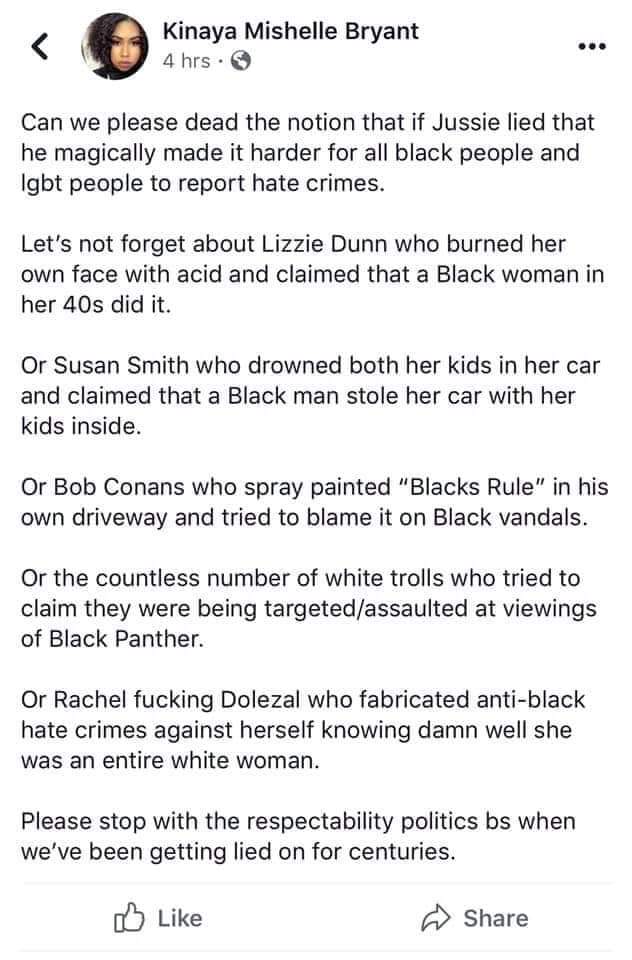When it came to light that actor and singer Jussie Smollett, who last month claimed to have been the victim of a hate crime, had been arrested by CPD for filing a false report, right-wing media was quick to pounce on this as proof that hate crimes aren’t really a big deal.
Commenters are practically gloating over this case – with a sort of “what will those hysterical SJWs say now”air – as though all hate crime accusations are now officially declared invalid.
Yes, because one particular accusation may turn out to be false, bingo, hate crimes are no longer a problem in our culture.
But wait, what kind of reasoning is that? This one case is evidence of nothing beyond its own particulars. You can not prove a general with a singular.
It should be obvious to anyone regarding this situation objectively that a single false accusation proves nothing about any other accusation ever made. In this respect, we can compare it to the oft-cited fear of false rape claims: one instance of a false rape claim does not automatically cast every other into suspicion. And in both cases, anyone trying to be objective should consider statistics. Statistically speaking, false rape claims are extremely rare, in contrast to the high incidence of rape itself.
Similarly, hate crimes are extremely common, and even becoming more frequent. The Bureau of Justice Statistics concluded from a study culminating in 2015 that over 250,000 hate crimes occur every year – though not all of them go reported. And no, a “hate crime” is not simply an insult or a slur. It’s an actual crime, such as assault or battery, motivated by prejudice.
So what are to conclude from the case of Jussie Smollett?
One thing we should not conclude is that hate crimes aren’t a problem. They are, and this makes it especially vile for anyone to fake one, making a mockery of the very real trauma victims go through, in order to garner attention or even to drive an agenda of justice. But justice is better served by truth – and certainly not by making innocent persons victims of false accusations.
And the truth is, men like Jussie Smollett are subjected regularly to abuse and discrimination for their sexuality, race, or both – and even if it turns out his own report is false, that does not magically evaporate all the real hate crimes happening every day.
We can expect, if this case turns out indeed to be a fake, to hear about it from opponents of racial and social justice for years.
Don’t let them dissuade you. This one case does not invalidate the need for reform.
But there’s more context to this simply than logic and statistics. We need to look at our long and brutal history of racial injustice, in order to keep perspective.
We need to remember that yes, false accusations – even if far less frequent than actual crimes, reported or not – are a genuine problem. They are acts of violence and violation against innocent persons.
And for most of our history, false accusations have broadly been made by white people, against people of color. We all grew up reading To Kill A Mockingbird, which accurately depicted how easy it was even for the worst of white men to destroy the life of an honest Black man, with a lie. Some aspects of the story we may have aged out of, in recent years – Atticus as White Savior, for instance – but the culture depicted by Harper Lee was our real culture, our real history.
It’s a grotesque assault on the realities of our history when opponents of #MeToo bring up the case of Emmett Till to discredit rape victims, given that he was a Black child falsely accused in a culture which would always take the word of a white person over even the most solid evidence exonerating a person of color.
Just last year, remember, a white woman claimed to have been attacked and raped by three black men. Her claims turned out to be utterly fabricated, but she was able to get off with a special form of probation that would allow her a clean record.
And when it comes to this point, it’s not really my place, as a straight white woman, to speak authoritatively, on a topic where the authority of women like me has so often been abused.
So I would like simply to direct you to the words of a Black woman, Kinaya Mishelle Bryant, on her Facebook page, reminding us of the long history we need to grapple with, if we’re going to talk about the problem of false reporting:
image credit:commons.wikimedia.org/wiki/File:Jussie_Smollett_2018.png














